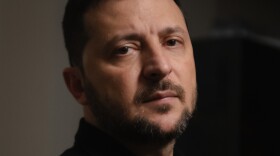Lisa Weiner
Lisa Weiner is a line producer on Morning Edition. For NPR, she's covered the humanitarian crisis in Afghanistan and traveled to Ukraine to cover the Russian invasion in 2022. Prior to joining NPR, she held positions as an editor at WTOP-FM, as an engineer at Radio Free Asia and recorded audio books for the Library of Congress. Weiner has a master's degree in audio technology from American University. She got her start in radio working the late-night shift as a student DJ in the basement of WRUR-FM at the University of Rochester. Weiner has lived in Tel Aviv, Israel, and Budapest, Hungary.
-
Some "climate jobs" are obvious. Others, not so much. So we talked to three people whose jobs address climate change in unexpected ways.
-
Volodymyr Zelenskyy says he is making an effort to answer any legitimate questions concerning his administration and its conduct during the war in Ukraine.
-
Two members of U.K. aristocratic families, Laura Trevelyan and David Lascelles, are apologizing for centuries-old injustices in the Caribbean, and asking others to join them in paying reparations.
-
Vice President Harris told NPR that the administration plans to bolster agents at the southern U.S. border after pandemic migration restrictions end, but said Congress must lead on broader reforms.
-
Everything from your vocal cord vibrations to breathing patterns when you speak offers potential information about your health. Researchers are collecting voice data to one day use in an app.
-
Lilith Fair brought an eclectic array of women's music to millions of fans and was the top grossing music festival of the 1990s.
-
NPR's Steve Inskeep talks to Khan, an Afghan national who worked as an interpreter for the U.S. military for four years, about the safety situation in Afghanistan following the Taliban takeover.
-
Bill Siegel works with companies that fall victim to the same type of ransomware attack that disrupted fuel supplies across large parts of the South and East Coast last week.
-
Iranian authorities first imprisoned Emad Shargi, a U.S. citizen, in 2018. Shargi, a businessman, was released from prison, then rearrested in 2020. His family hopes that speaking out may help him.
-
Iran and the U.S. are holding indirect talks on restarting the 2015 nuclear deal. Robert Malley, the Biden administration special envoy to Iran, says a deal would be in the interest of all Americans.










